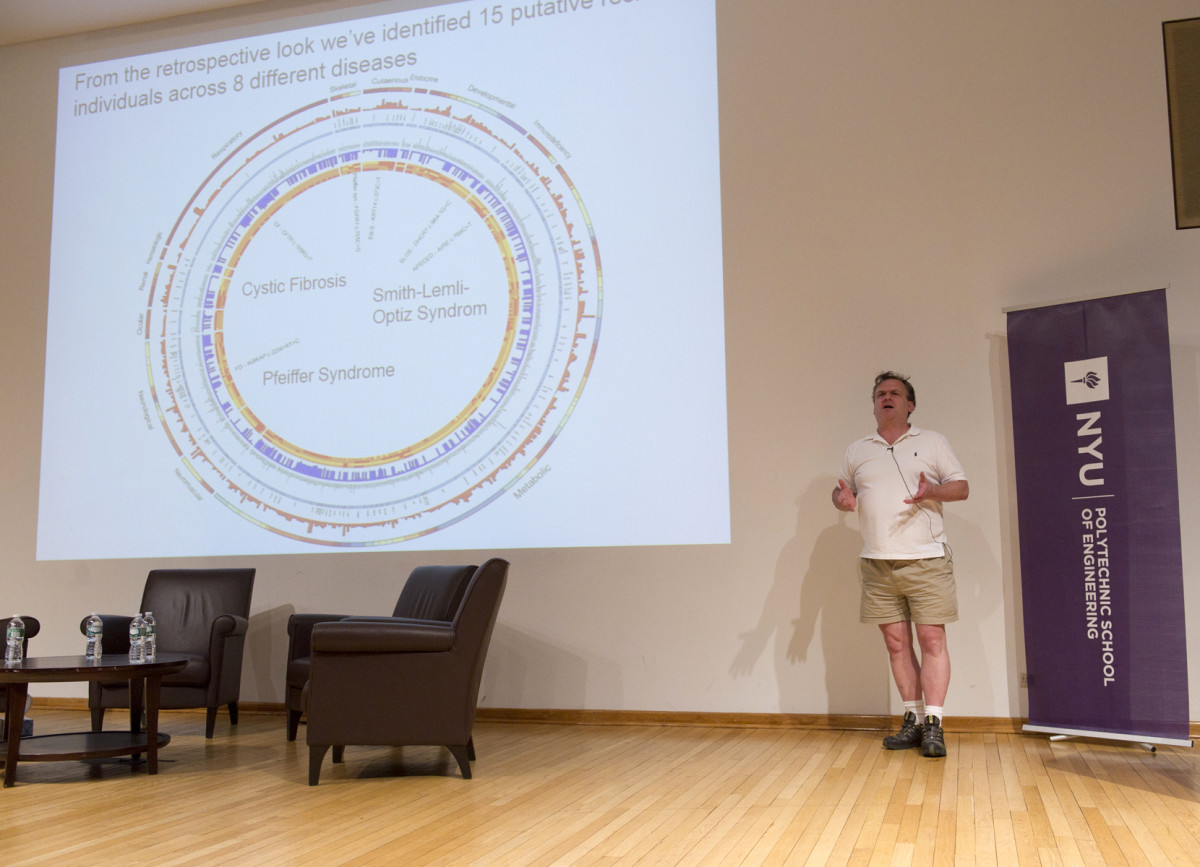If you learned about cystic fibrosis during biology class in high school, it was probably described as an inevitable condition of those whose genes included a specific set of mutations. It was thought to be inevitable because no one had ever found anyone with those mutations that didn’t have it. On the other hand, no one was checking people’s genes to see if they had the mutations when they didn’t show symptoms.
During the 2015 Lynford Lecture at NYU Poly, Mt. Sinai Hospital’s Eric Schadt explained how a big data methodology revealed a remarkable truth: When scientists look at large sets of genomic data of broad pools of test patients, they find small numbers of people with the genetic markers that would make them genetically predisposed to various diseases, and yet they weren’t symptomatic.
The remarkable finding here is that genetics do not necessarily represent an individual’s fate and somehow these individuals’ bodies worked out ways around their genetic disadvantages.
Schadt refers to these people as “heroes” and he believes that by studying them the medical profession can find new strategies of care for patients who are symptomatic.
Schadt is the director of the Icahn Institute for Genomics and Multiscale Biology, among other appointments, at Mt. Sinai. His talk served both as an exploration of a data-driven approach to determining strategies of care, an argument for a network-oriented approach to determining multiple interventions against disease as well as an argument for encouraging non-expert investigation of biological problems.
For this latter point, we have the example of Suneris, a company whose completely novel approach to stopping bleeding was discovered by a college freshman, not a doctor.
Here are some other compelling points from Schadt’s talk:
- Bias. A huge stumbling block in the healthcare system is the bias toward acute care. Acute care is treating problems. That’s what hospitals are set up to treat and that’s what they get paid the best to deal with. It is not, however, what is best for patients.
- Lots of apps, lots of data. A lot of data is getting collected by something like 50,000-100,000 mobile apps that in one way or another relate to health. With all this data, it’s possible to start getting very serious about targeted, specific prevention strategies for individuals that treat them as a whole person.
- Locus of power. In 5-10 years time, there will be far more data about your health outside of medical centers than inside them.
- Massive new studies powered by apps. Mt. Sinai just launched an app in collaboration with Apple to study asthma sufferers and help them manage their condition as they did so. It’s in the App Store. Within six hours of announcing it with Tim Cook, Mt. Sinai had enrolled several thousand people, a number that would take traditional studies years to achieve.
- Informed consent. Schadt called the informed consent process built into the app its “crowning achievement.” Subsequent testing showed that users who went through their informed consent dialogue understood what they were agreeing to better than people who went through an informed consent process with another person.
- Data yields surprises. By building a complete model based on multiple networks and developing it to the point that they were able model how different genes might express themselves under different conditions and different treatments, Mt. Sinai scientists were able to find a drug that was indicated for a wildly other use relating to irritable bowel syndrome. Big data makes it possible to find treatments by just running different inputs through models, regardless of indication or researcher assumptions.
Watch the whole lecture here (cued up to the start of the talk):
Before you go...
To keep our site paywall-free, we’re launching a campaign to raise $25,000 by the end of the year. We believe information about entrepreneurs and tech should be accessible to everyone and your support helps make that happen, because journalism costs money.
Can we count on you? Your contribution to the Technical.ly Journalism Fund is tax-deductible.
Join our growing Slack community
Join 5,000 tech professionals and entrepreneurs in our community Slack today!
